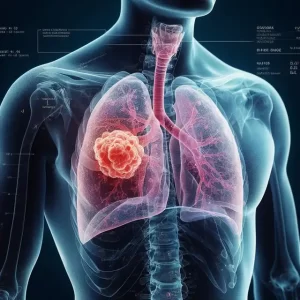Just a few drops of blood to find the key information on cancer treatment
- EPA Announces First-Ever Regulation for “Forever Chemicals” in Drinking Water
- Kochi University pioneers outpatient bladder cancer treatment using semiconductor lasers
- ASPEN 2024: Nutritional Therapy Strategies for Cancer and Critically Ill Patients
- Which lung cancer patients can benefit from neoadjuvant immunotherapy?
- Heme Iron Absorption: Why Meat Matters for Women’s Iron Needs
- “Miracle Weight-loss Drug” Semaglutide Is Not Always Effective
Just a few drops of blood to find the key information on cancer treatment
- Red Yeast Rice Scare Grips Japan: Over 114 Hospitalized and 5 Deaths
- Long COVID Brain Fog: Blood-Brain Barrier Damage and Persistent Inflammation
- FDA has mandated a top-level black box warning for all marketed CAR-T therapies
- Can people with high blood pressure eat peanuts?
- What is the difference between dopamine and dobutamine?
- How long can the patient live after heart stent surgery?
Nature: Just a few drops of blood to find the key information on cancer treatment.
With the rapid development of medical technology and the continuous improvement of medical level, there have been many good news in the field of cancer treatment in the past ten years. However, we still haven’t been able to change the situation of “talking about cancer”.
Extensive clinical studies have demonstrated that over time, cancer cells evolve to accumulate molecular changes that make them less sensitive to specific drugs.
Because each cancer is unique, each patient responds differently to treatment.
Despite the increase in treatment options, common resistance issues and non-personalized treatment regimens ultimately lead to treatment failure.
On July 20, 2022, researchers from the University of British Columbia (UBC) in Canada published a research paper entitled: Deep whole-genome ctDNA chronology of treatment-resistant prostate cancer in the journal Nature .
The study’s first-of-its-kind test of the DNA that metastatic cancer enters the bloodstream (i.e. circulating tumor DNA, ctDNA ) reveals features unique to each patient’s cancer through deep whole-genome sequencing of ctDNA Biology provides unprecedented insights.
This approach could help clinicians detect treatment resistance more effectively, and thus select individualized treatment options that can better improve patient outcomes.
Corresponding Author Alexander Wyatt said that with just a few drops of blood, key information about a cancer patient’s overall disease profile and how to better control the disease can be found.

When metastatic cancer has spread to other organs in the body, the chances of a cure are drastically reduced, even with chemotherapy and new targeted therapies.
Because of the invasive nature of cancer cells and the high risk of complications, clinicians rarely use biopsy to determine the best treatment plan.
It is also a major obstacle to research and treatment of metastatic cancer.
Plasma circulating tumor DNA (ctDNA ) is an extracellular DNA that exists in plasma, cerebrospinal fluid and other body fluids, mainly from necrotic or apoptotic tumor cells, effluxes secreted by tumor cells and circulating tumor cells.
Plasma ctDNA is an emerging minimally invasive analysis method in the medical field that is easier and less invasive than biopsy.

In oncology, the development of cancer can be tracked with high resolution through ctDNA detection.
Quantification and characterization of ctDNA in blood can inform early cancer diagnosis, treatment selection, and monitoring of recurrence.
However, the full potential of ctDNA to reveal mechanisms of tumor evolution and acquired resistance remains unknown.
In the new study, researchers performed deep whole-genome sequencing on 61 plasma cfDNA samples and matched metastatic tissue samples from 33 patients with aggressive prostate cancer.
These samples were collected serially over the progression of different treatment lines.

The researchers found that samples with a high ctDNA fraction could dissect the evolutionary history of metastatic cancers, the temporal evolutionary dynamics of subclones, and uncover genomic and transcriptomic mechanisms of treatment resistance.
This resolution has previously only been achieved with invasive and repeatable fresh tissue biopsies.

Whole-genome sequencing of ctDNA provides a wealth of information about the spread to different metastases throughout the body.
Using a newly developed computer program, researchers can pinpoint the unique genetic makeup of various cancers in patients, leading to a more comprehensive understanding of the disease.

Metastatic cancers are complex, and our understanding of them is limited, said study corresponding author Alexander Wyatt, assistant professor in UBC’s Department of Urology .
Whereas traditional biopsies provide only a small snapshot of the disease, this new test can paint a more complete picture of cancer metastases throughout the body, all from this simple and easy blood test.
This next-generation ctDNA test could help clinicians choose the treatment options most likely to benefit their patients.
He also said the information could also be used to help predict whether treatments will work or not for patients.
This new study has advanced ctDNA profiling technology from an emerging clinical detection tool to a genome-scale deep dive into clinical biology to explore new models of advanced metastatic cancer.
In addition, the study sheds light on how cancer drug resistance develops. From multiple ctDNA samples collected over time, the researchers learned about the evolution of the cancer’s response to treatment.
These findings reveal new genetic mechanisms of resistance to the most common drugs in metastatic prostate cancer, and more broadly how ctDNA profiling can be used to understand treatment resistance in other types of cancer.
Alexander Wyatt concludes that the technique can be applied to other types of cancer to understand how these tumors metastasize and how they ultimately evade treatment.
It will also help us design next-generation cancer therapies that are more effective against drug-resistant diseases.
This relatively inexpensive and highly scalable minimally invasive technology is currently undergoing cutting-edge precision oncology clinical trials at the Vancouver Prostate Centre and BC Cancer .
Reference:
https://www.nature.com/articles/s41586-022-04975-9
Just a few drops of blood to find the key information on cancer treatment
(source:internet, reference only)
Disclaimer of medicaltrend.org
Important Note: The information provided is for informational purposes only and should not be considered as medical advice.



